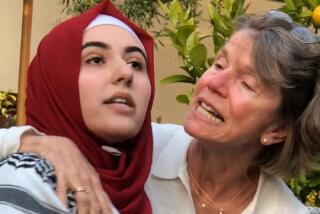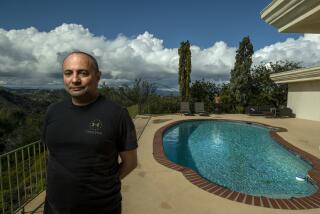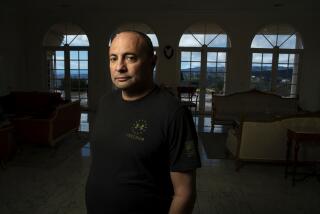He Met PLO Backer : Israeli Furor Embarrasses Shcharansky
- Share via
JERUSALEM — A controversy over a meeting with a prominent supporter of the Palestine Liberation Organization has underlined the difficulty former Soviet dissident Anatoly Shcharansky faces in maintaining his standing as a champion of human rights in his new home.
After a day of steady criticism, Shcharansky on Thursday placed a quarter-page advertisement in two Israeli newspapers repudiating his meeting with the PLO supporter and referring to the PLO as a “scourge” and a “pestilence threatening all civilized people.”
Faisal Husseini, one of three Palestinians that Shcharansky met with, then told a press conference in Jerusalem that he was saddened “to see such a great man suddenly turned small.” He charged that Shcharansky’s action proves that Israel has “corrupted” him.
The controversy, the most serious involving Shcharansky since his release from a Soviet prison and emigration to Israel nine months ago, has clearly embarrassed him.
Its roots lie in his meeting last Monday with Husseini, who is head of East Jerusalem’s Arab Studies Society, a Palestinian research institute, and a spokesman for the Committee Confronting the Iron Fist, which wages a publicity campaign against what it describes as the repression of Palestinians living under Israeli rule.
Husseini’s father led Arab irregular forces in Jerusalem during the 1948 war that followed the creation of Israel as a state. Like most Arab residents here, Husseini considers the PLO the legitimate political representative of the Palestinian people, and he is considered one of the PLO’s most loyal supporters here.
Deportation Appealed
Husseini said Thursday that he sought the meeting with Shcharansky to acquaint him with the case of Akram Haniye, an imprisoned East Jerusalem newspaper editor. The Israeli occupation authorities have ordered Haniye deported for activities considered hostile to the state.
Haniye, 33, is appealing the deportation order, which was issued without a trial based on evidence the Israelis say is too sensitive to be disclosed in court.
News of the meeting leaked out and was published Wednesday in the Hebrew-language newspaper Maariv. Shcharansky was quickly condemned by Israel’s political right.
Rabbi Chaim Druckman, a member of Parliament representing the rightist Morasha party, described the meeting as a “grave blow at the state of Israel and an encouragement of loathsome terrorists.”
In a hastily arranged television appearance Wednesday night, and again in the ads he took out in Thursday’s editions of Maariv and the English-language Jerusalem Post, Shcharansky said he had been duped into agreeing to the meeting.
“I learned that the delegation that met with me was identified with the PLO only after our meeting,” he said. “Had I known this fact in advance, the meeting would never have taken place.”
Shcharansky called the PLO an “organization of cutthroats” and said that those who support it “have placed themselves beyond the pale of civilized society.”
He said he had full confidence in the government’s efforts to protect the country against “the scourge that calls itself the PLO. The pursuit of this goal, in accordance with the laws of the state of Israel and subject to the judicial scrutiny of the Israeli Supreme Court, is in no way a violation of human rights,” he said.
The statement surprised many Israelis if only for its harsh tone. Shcharansky had said when he arrived in Israel last February that he wanted to study the Arab-Israeli conflict at first hand before commenting on human-rights issues involving the Palestinians.
“To say the truth, I didn’t like the style,” commented Yossi Sarid, a leftist member of parliament.
Sarid, referring to the religious-nationalist leanings of Shcharansky’s wife, Avital, added: “He’s under very heavy pressure from the rightist side of the Israeli political arena, and apparently he doesn’t want to disengage from his wife’s camp.”
Husseini told reporters Thursday that he had opened his conversation with Shcharansky by explaining his political stand.
“And, indeed,” he went on, “as I sat and exchanged views with Mr. Shcharansky that day I felt I was in the presence of a great man--a man who is prepared to look across political and religious borders and still recognize fellow human beings who are suffering from oppression and injustice.”
He added, “It was a totally different man whom I watched on the television screen.” He accused Shcharansky of distorting their meeting in his statement.
More to Read
Sign up for Essential California
The most important California stories and recommendations in your inbox every morning.
You may occasionally receive promotional content from the Los Angeles Times.













